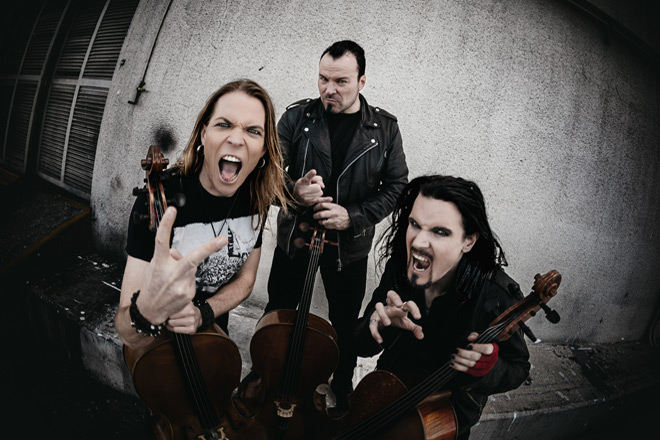
Initially coming together three decades ago, Finland’s Apocalyptica first began performing classic Metallica tunes, but uniquely in a Classic style on cellos. Something that garnered them a lot of attention, their popularity continued to grow as did their own music; first releasing all originals album Cult in 2000, leading into immensely successful collaboration albums years later with 2007’s Worlds Collide, followed by 2010’s 7th Symphony.
Only a sample of their expansive repertoire, in 2024 they went back to their roots to record another highly unique Metallica record they call Plays Metallica Vol. 2. Something that only compliments what they did nearly 30 years ago with 1996’s Plays Metallica by Four Cellos, Apocalyptica honor their past, while still looking forward toward the future. Gracious to be a part of everything since the start, leading Cellist Eicca Toppinen sat down to talk about the wild, unpredictable ride of the band, the work behind their latest album, plus much more.
Cryptic Rock – Last we connected was back in 2015 for the Shadowmaker record. A lot has changed since that time. During that conversation, you had mentioned that you never really thought you were forming a band initially with Apocalyptica, and just snowballed into something much bigger. Now, all these years, what has this journey been like for you?
Eicca Toppinen – It’s been a crazy journey in good and bad, but mainly in good. What Apocalyptica accidentally formed, or it got formed while we were doing it, opened a totally new world. It was a totally new way to think about music and create music.
We’ve been very fortunate to be able to work with such great people over the years, great songwriters, singers, producers, mixing engineers, etc. It’s been great. It’s been a bumpy road, but every road is bumpy. Today, I’m most happy that we are pretty much on top of our game mentally, that we are super inspired, motivated, and excited; which I think is the greatest thing after all these years.
Cryptic Rock – Remaining inspired is not as easy as one would think. People would think you are in a band and you just keep playing, but let’s be honest, we lose a little bit of inspiration sometimes. We may feel discouraged and think, “Why are we doing this anymore?” The point is, when you are doing something creative, it takes a lot to keep going.
Eicca Toppinen – Yeah. You have to reframe your reasoning, actually many times. I think it applies to everything, but especially in creative work, that you need to feel some challenge. The excitement comes from trying to reach the unknown, that you have an idea that you want to do this, or you want to do this kind of album, but you don’t know how it’s going to happen. We know certain principles. Such as, this is how we record, blah, blah, blah.
How it’s going to turn out is this big adventure. The biggest spark on the whole creating ‘new’, is creating something that you are not sure about. You don’t know exactly how to do it and where it’s going to lead. You have to reframe that, and also, we had to reframe a lot on some points like the touring motivation. It’s easy to get unmotivated on long tours if you don’t really pay attention to why you are on tour. If you’re on tour only to make money… you should change the job.
I learned that I take my kicks, firstly, from the music I play; because I love it. Then I need to remind myself that, “ok, even if this is tour date number 78 for me (or this program), for the audience, it’s the very first time, and it’s a very unique moment.” I need to put myself all in; because the audience deserves the best of us.
In the worst times, it was more like a duty. Doing 200 shows with one album, it can easily become a duty. It is something that you do it; because you have to do it at some point when you’re exhausted. Actually though, it’s a privilege that we can do something like that, it’s amazing what we can do. That’s why when they talk about spirituality and such it is about the importance of gratitude. It is exactly that, we remind ourselves to be grateful for the things that are actually great.
As humans, we tend to get used to things. We start to take amazing things for granted without appreciating them. That kind of learning happens along the way. You learn how to stay grateful for all the opportunities and possibilities, no matter what the difficulties surround them. That’s not so important; there are always difficulties and challenges around everything you do. It’s more about the inner framework and how we set up our mindset.
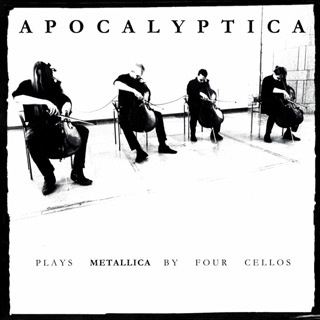
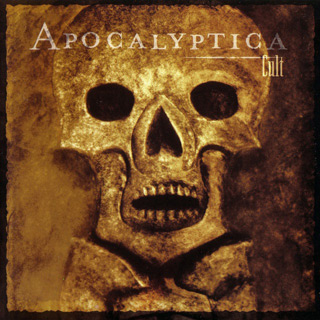
Cryptic Rock – Most certainly. Everything you said is so true. That’s the key to life in general; it is about staying grounded and grateful. When we spoke about Shadowmaker, you had Franky Perez on as the lead singer, and he recorded for the whole record with you. It was the first time that the band ever had recorded with one singer for an album. Then you followed up in 2020 with an entirely instrumental record for the first time in quite some time, Cell-0. What led to the decision to do the entire instrumental record like that?
Eicca Toppinen – I think it came from that after Shadowmaker tour. We had the plan to play a few anniversary shows for 20 years of the first album. I asked the agent if we could do 16 to 18 shows in Europe just to play some capitals, etc. It turned out to be 230 shows, world tour in the final end. (Laughs) It was so much more fun that we were expecting to go back to those Metallica tunes with how it started. We had over 20 years of experience and learning. The whole tour was instrumental and that started to spark the idea that it would be actually exciting to do a fully instrumental album and take full control of ourselves.
It’s always been great to work with a lot of people and different singers. Then there are certain challenges when pulling together an album with a lot of guests. There are so many moving parts that are not in your control.
We released our third album, Cult back in 2000, and we went a little bit back to that spirit with Cell-0. We locked ourselves in the studio just with the recording engineer, no producer, nothing, and wanted to create something that we can create without any other influence. We didn’t have a record deal. When we recorded the album, we were like, “Okay, we will do the album. After that, we will find out if somebody wants to release it.” That felt most exciting. We knew that it’s not going to be a commercial success or anything, but it was something that we just had to do for ourselves and it turned out really great.
That was then a step towards the Plays Metallica Vol. 2 album. Cell-0 was such a strong album for us, and that probably gave us the confidence and feeling that, “Okay, we are so solid as Apocalyptica.” Doing another Metallica album didn’t feel like we were backing up, it’s actually a step forward. We’ve been always talking that one day we will do this Plays Metallica Vol. 2 album. That’s been in our talks for over 20 years… pretty much since the first album. Now it just feels like it’s the right time and feels exciting.
Cryptic Rock – It is interesting to hear how it all played out. As you mentioned, the 2020 record is kind of like a precursor to Plays Metallica Vol. 2 and something that has been a long time coming. You released this new album, which is a follow-up to your debut album, in a way, all these years later. There are so many tunes to choose from. What led to the song selections for this record?
Eicca Toppinen – Oh, yes. That was actually an exciting part of the process. Of course, we didn’t want to redo songs that we have recorded in the past. We have recorded pretty much all the biggest hits of Metallica, more or less. That narrowed it down a little bit. Then there were a lot of our favorite songs that we always wanted to play. Then it was really challenging; because to make this album production exciting for us, it was like we wanted to set the bar really high.
We were thinking, “If Apocalyptica makes a new Metallica album, it really needs to make sense.” There needs to be a reason for it. It just can’t be something that we just do, that we can spit out. We didn’t want to replicate anything from the first album. We really wanted to feel that every song we make needs to have a reason to be there on the album. For us at least, it needs to feel like, “Okay, we are bringing something new on the table. We are giving a new perspective. We are showing Metallica’s original song from a new perspective and bringing out some other layers or colors of the original that are necessarily not coming out in the same way from the original recording by Metallica.”
That actually made it not easy. I think we went through over 20 songs. We listened through multiple times, all of Metallica’s back catalogue. We tried a lot of songs. It was not a question of which original song is great… it was more about – is Apocalyptica’s version of the song going to be great? That’s not the reason why there is nothing from recent albums. It is not because there are no good songs there; because there are great songs on all the latest Metallica releases. But when we take out Hetfield’s lyrics and his performance, and then we take the whole Metallica performance/sound and what makes them unique as a band, what are we left with? Do we have enough material that it’s really exciting when played by cellos? That was the challenge.
Sometimes it was, “Okay, this is turning okay, but we already have this song from here, which works better.” We always were like, “Okay. Competitive songs, the weaker went out.” It was quite a process. We tried to be supercritical with the versions. If I summarize it, we wanted our versions to be different from originals, but to be different just to be different, is bullshit, there’s no meaning. It had to happen that the version was somehow different. It had to happen organically. We had to really dive into the core soul of the song to understand what makes this song this song. We had to eat it, digest it, and kind of own it. We had to feel it’s our song now in a certain way.
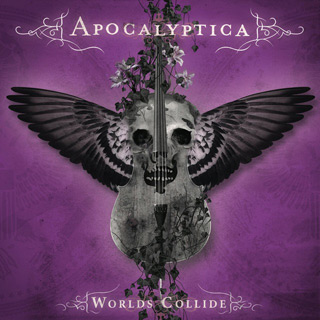
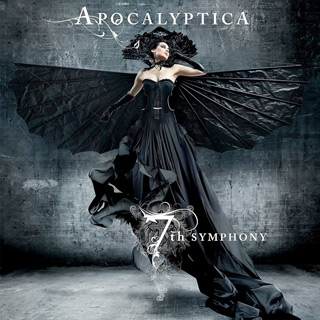
Cryptic Rock – Right. Well, it had to be a difficult challenge like you just outlined. It is important to make it your own, which you did. There are definitely colors and layers in all these tracks that you provide your own rendition on that stick out.
In particular, it was surprising to hear you record a verision of the song “St. Anger.” Now, 2003’s St. Anger is as a whole an album, which is probably the most controversial that Metallica has ever released. There is a lot of division about it. To be honest, a lot of people really did not like that record. However, your rendition of “St. Anger” is amazing! Quite beautiful, it sounds so different from the original.
Eicca Toppinen – Yeah. I really wanted to have something from St. Anger. I knew that there was something. Personally, I got to know songs like “Frantic” and “St. Anger” through the live performances; because I just happened to be around and see many Metallica shows when they released the album. I always thought they’re really great songs.
I was listening to St. Anger a lot last summer. We were already in the recording process but I thought, “Okay, I really want to figure out if “St. Anger“ turns out good.” I got through the sound; because I think the problem with St. Anger album for people is the sound. That they feel the sound is pushing them out. Once you get used to the sound, then a totally new layer of the music opens. It’s a fucking amazing album! It’s so furious, it’s so angry, and you can feel it. I just knew that something would come out of it, but we had to change it radically not to make it boring; because there are not too many elements in “St. Anger.” The new angle came because I felt the riff actually could be more like Pantera style with more of a groove. I made it halftime, which makes the whole approach to the riff different. That’s why I kind of figured out to slow it down, to make it even more heavy.
When we played the first album release show with the new program, “St. Anger” is the heaviest track in the set. It’s crazy. In a certain way, it’s heavier than “Battery” or “Blackened” because it’s more brutal. It’s something different. I’m so happy that it turned out so well for the record.
Cryptic Rock – It certainly did. It definitely sticks out. When you see it on the track list, you think, “St. Anger?, I’m curious to hear that.” It lives up to expectations of something really special.
With the record out now, you are going to be coming to North America in the winter of 2025, the beginning of the new year. You are going to be playing with Nita Strauss as well. How excited are you to come back with this album and being able to play in front of all these different cities?
Eicca Toppinen – Super excited, because it’s a totally new show. It’s a new program. Touring America and Canada is always great fun. It’s a little bit sad that it’s not till February, but we can’t be everywhere at the same time. I’m very excited and I think it’s a really cool package. Metal fans will have a great night.
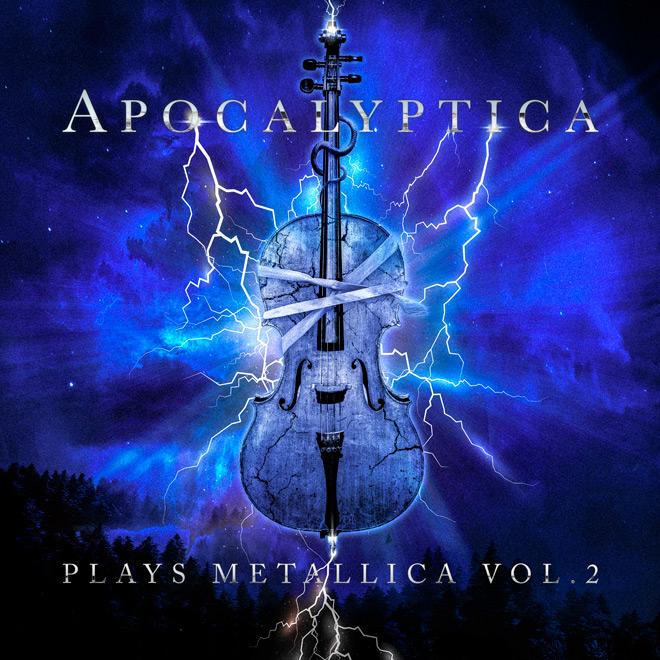
Cryptic Rock – Yes. Nita is a wonderful, exceptional guitar player. Any possibility of a collaboration between yourselves and Nita during the live sets?
Eicca Toppinen – Let’s see. We haven’t thought about it; because we’ve been kind of overloaded with the album and getting the show together. There’s still some time to go… so you never know what will happen.
Cryptic Rock – That would be exciting to see, because she is an exceptional musician. With the new album out and your extensive touring, are there plans for a new original album?
Eicca Toppinen – Yeah, our way of doing has always been that we do albums that excites us the most at that very moment. It’s a little bit too early to think about it. The album kind of gets a new life when we start the tour with it and experience those songs, we perform those songs, experiencing those together with the live audience. That starts to lead our interest into some direction, usually. We always have tons of ideas, different ideas, but it’s impossible for me to know yet what will spark the most in one or two years from now.
It is for sure that we are going to work on new music and release new music along the way during the winter. That doesn’t stop. In modern times, the best part of the digital world and distribution is that we can release music whenever we feel like. It’s not like old-school times. Then it was you do an album, then you tour with the album for two years, and you release basically nothing in the meanwhile.
Today, especially for bands like Apocalyptica, it is great; because we are so versatile and we have so many different styles/interests. We released this church concept live album last year (Live In Helsinki St. John’s Church). We are releasing these singles with different singers. We did the classical EP too. There are so many different paths we go. We actually kind of work on all those different versions of Apocalyptica simultaneously, which is really great.
The whole album structure is a different ball game. It requires quite some more time to figure out – what is the way to go and the most exciting way to go? I think that’s the reason why we’re talking and why we still exist. That’s what we’ve been doing. We’ve always been doing what excites us the most. I think that has kept us alive. It hasn’t been commercially the best choice. (Laughs) People tend to like things that they never change. For us, the change has been inevitable. I think that’s the way we continue. That’s how we feel it’s most fun for us; because we can experience something new and we can explore the unknown territories of music.
Cryptic Rock – Right. That is what makes it interesting for the more astute fan who appreciates that ability to want to explore. Doing the same thing over and over can be boring, particularly for the creators.
Eicca Toppinen – Yeah, I don’t see any fun in doing the same thing.
Cryptic Rock – In the same breath, you have to follow what is interesting to you at the time. You cannot create something just for the sake of creating something within a particular frame, just because you are told to. If you are interested in a different form of music at the time, you have to follow that. Otherwise, it will not feel real.
Eicca Toppinen – Yeah. If I were to say that, “Okay, in five years, we will release this and that album.” Why would I tie my life into a plan that I think is great now, which may turnout is not great in two years and I’m not excited at all? How to create something cool, I think the only way is that you need to really feel it. You have to feel the excitement.
It’s not mandatory for all listeners, but there are luckily a lot of listeners that actually listen to the music in the way that they want to feel something. There needs to be emotion and energy of some kind in the music that resonates. I think that’s the way to get that on the album; you have to resonate yourself to the fullest.
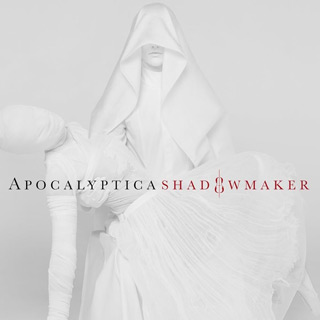
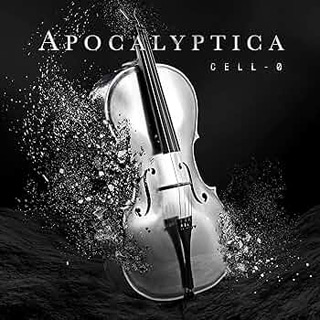
Cryptic Rock – Right. It is also a very human emotion, something that artificial intelligence cannot reproduce. Although some would like to believe you could.
Eicca Toppinen – Yeah. If we would do this for money, I can imagine easier and more effective ways to make money. It can’t be the motivation. It can’t be the fame. It can’t be anything like that. The motivation needs to be the music if you want to maintain a longer path.
Cryptic Rock – Absolutely right. You spoke about production, and the band produced Cell-0 themselves. Production is so important. Playing the instruments that you are playing, it is vital; because the breadth in between the notes is important. The dynamics are important. What do you think of modern Rock and how it is currently, by and large, being produced?
Eicca Toppinen – There was a reason why we went to Joe Barresi with this album; because he’s an old-school producer in all the best attributes. We wanted to create an album that has feelings. The feeling comes from that it’s not over-polished and it’s not over-fixed. Today’s music is too hygienic. People play in the studio and they’re like, “Oh, we can fix it.” Then people are editing it together and it becomes breathless in the final edit.
Actually, a real way of making albums at least, where you use live instruments and it’s not programmed, you try to capture the performance for every take and for every little thing that is recorded. You try to capture something magical, which is the performance. It’s the combination of performance and the sound. Joe is a fantastic producer with that and he’s all about that. He is about – let’s keep it real, let’s make it real, and how can we be more real?
Everybody can do things their own way. Personally, for me, this turbo-boosted, over-fixed, edited stuff doesn’t really talk to me. It doesn’t excite me in any way. I know, in America for example, what comes out on Rock radio, the culture seems to be that it’s not about good songs. It’s if the sound is right. If the sound is right for the radio station, then the radio station plays it… no matter if the song is good or bad. That’s pretty sad, I think. Luckily, there are other platforms. Luckily, we have the freedom that we can do music our way, and there’s a possibility that somebody who feels it, finds it.
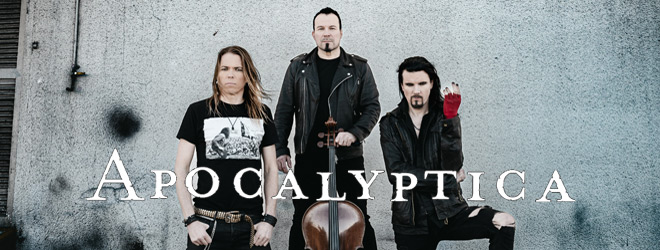

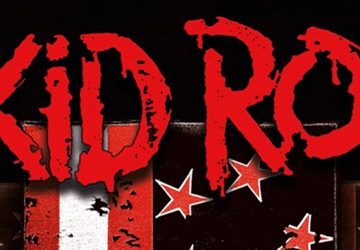
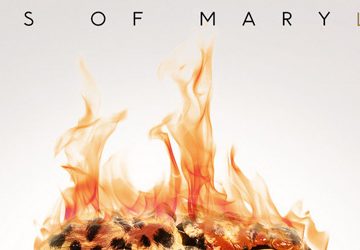


No comment